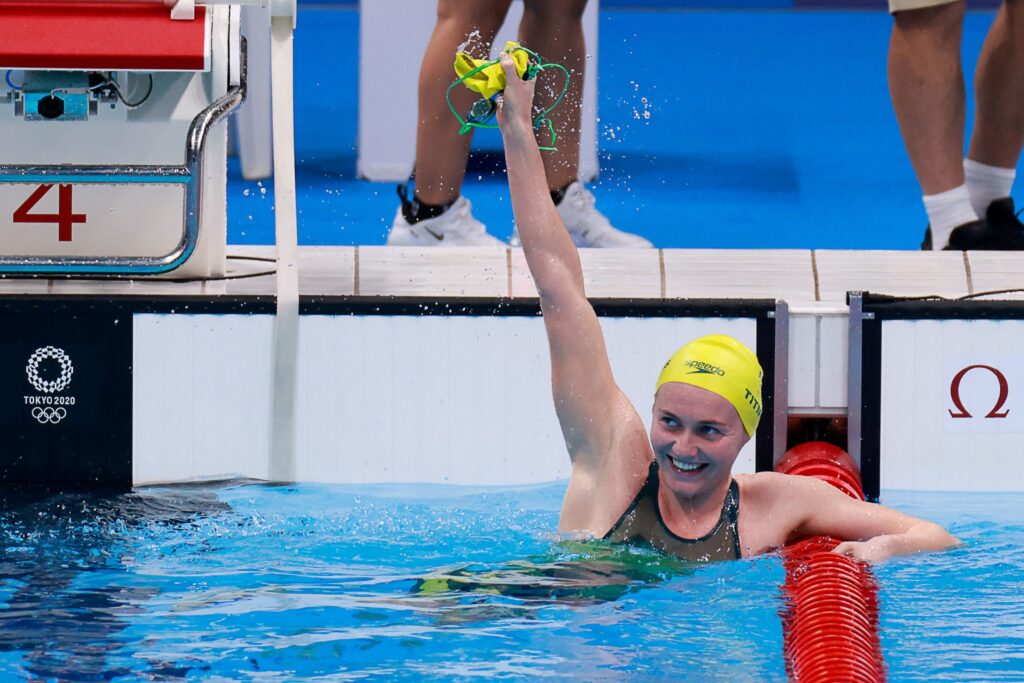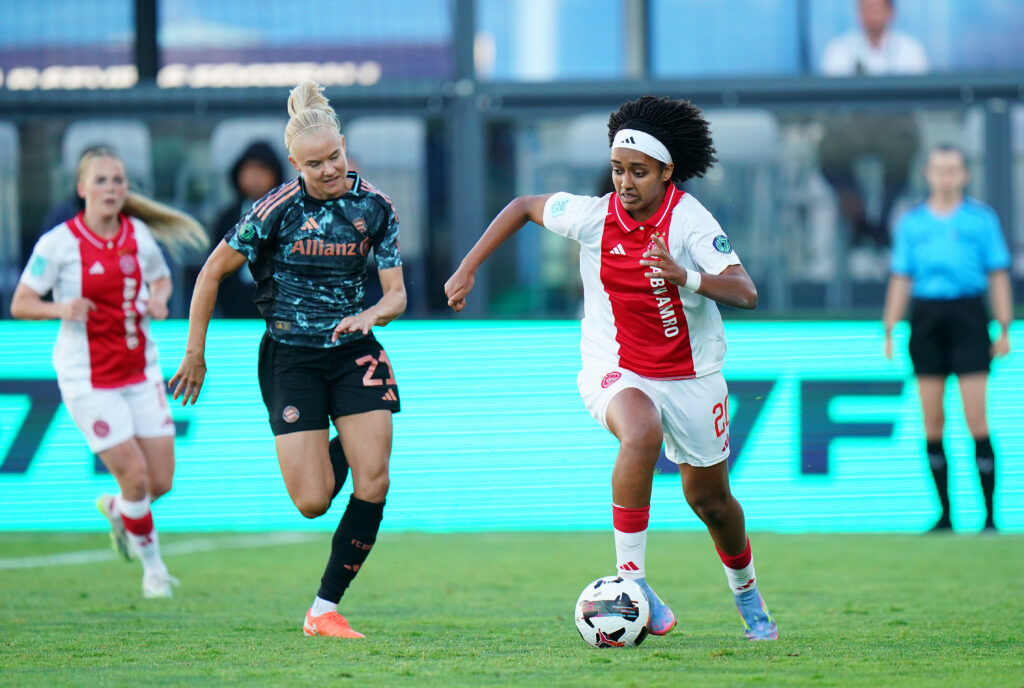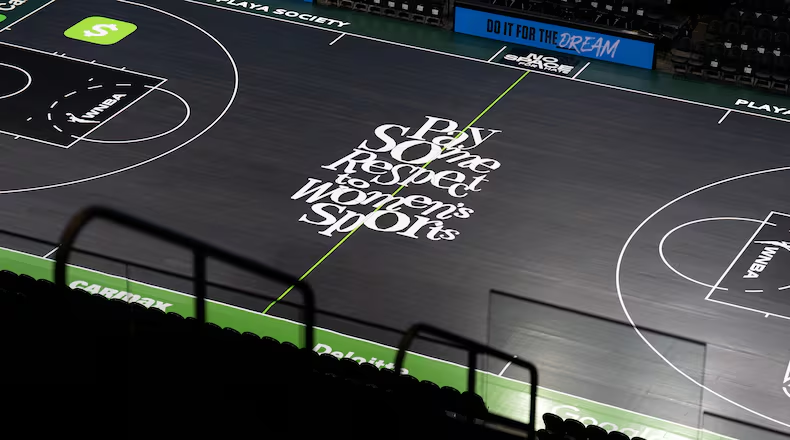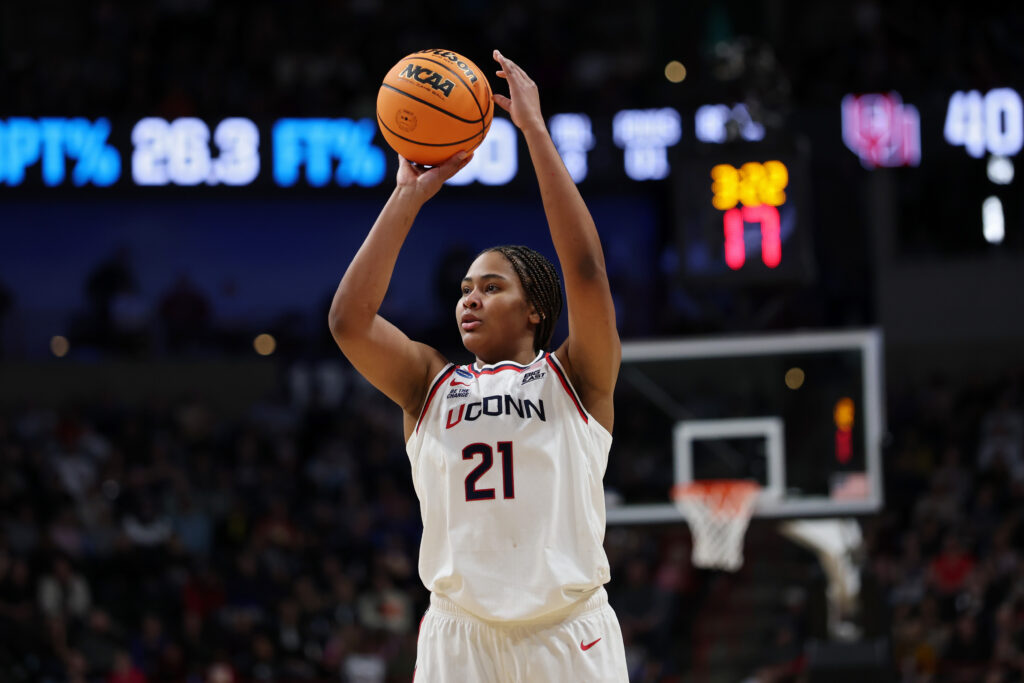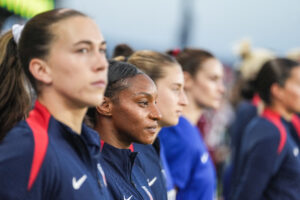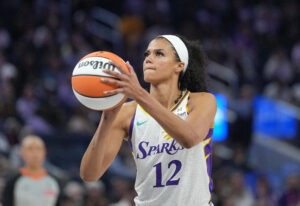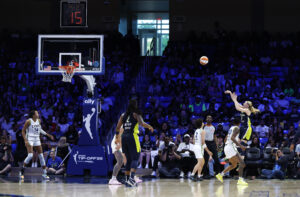Ariarne Titmus didn’t do much swimming from August through September.
The first two weeks after the Olympics meant quarantine. It was then that Titmus had a chance to reflect on everything she had accomplished.
In Tokyo, the Australian swimmer won gold in the 400-meter freestyle, handing Katie Ledecky her first-ever individual Olympic loss. Titmus’ time of 3:56.69 set an Australian record and made her the second-fastest swimmer in the event, falling just short of Ledecky’s world record from the 2016 Rio Olympics.
She went on to win another individual gold in the 200-meter freestyle, this time setting an Olympic record. Also medaling in the 800-meter freestyle and the 4×200-meter freestyle relay in Tokyo, Titmus returned to Australia with a haul from her first Olympics — two gold medals, one silver and one bronze.
So, it wasn’t easy for the 21-year-old to go from peaking in her sport to, essentially, doing nothing.
“It was a really strange feeling going from the biggest high of your life down to pretty much the most boring two weeks of my life,” Titmus tells Just Women’s Sports. “I don’t think there’s a point in your life where you’re forced to rest and do nothing.”
There was press to be done, and sleep to catch up on. The gravity of what she had accomplished, as a swimmer from the small Australian state of Tasmania, didn’t really set in until Titmus was able to step foot outside of the bubble that she had lived in for the two months leading up to and during Tokyo.
“When I saw my family and the impact that my performance had on them and the emotion that came off, I think that’s when I started to realize what I had achieved,” she says.
“Even coming home now to Australia and walking around and seeing people, I just feel like our country’s had a really rough trot with COVID the past few months. Half the country is in lockdown at the moment. I just think the Olympics probably really lifted the spirits of people.”
***
Steve Titmus knew after Ariarne won her first national junior championship at 15 years old that his daughter could do something special in swimming.
“When Ariarne touched the wall first and we jumped in the air with joy and excitement, the people in front of us turned around and they looked at us and they went, ‘What?’” Steve recalls now. “It was like, ‘No, you’re from Tasmania. You can’t win. That’s an absolute impossibility.’”
After the race, Swimming Australia approached the Titmus family with the notion that Ariarne could one day swim for her country. With 75 percent of Australia’s national team swimmers and coaches working out of Southeast Queensland, the family started having conversations about moving to the area for better training opportunities.
Ariarne talked about it with her parents, Steve and Robyn, and her sister Mia. After about a month of deliberation, they decided she would go.
“We’ve lived by the motto in our family that we never made sacrifices — we made choices,” Steve says. “We made the choice to move to Queensland for her to chase her dreams, but that also gave her younger sister Mia schooling opportunities and career opportunities.”
When training under Peter Gartrell took Ariarne as far as she could go, the Titmus family had another decision to make. Gartrell knew Dean Boxall, who coached one of the best age-group squads in the country at St. Peters Western, and approached him about the possibility of taking her on.
Ariarne knew that making the switch would benefit her swimming. And it helped that their personalities clicked, with Boxall describing her as “a bit of a chatterbox” before their first meeting.
“I went and met with Dean and his values aligned with me. He expects hard work and I love hard work,” Ariarne says. “I also enjoyed him as a person. I felt like we would click really well. I started and everything just fell into place.”
“He was quite flamboyant as a coach,” Steve says. “It was a style that we thought Arnie just might gel with.”
Within the first couple of months of Titmus and Boxall working together, Titmus cracked 4:10 in the 400-meter freestyle for the first time. By the end of 2016, she made her first senior national team.
After Titmus’ first World Championships in 2017, people started paying more attention to the young up-and-comer who might one day unseat Ledecky. Those rumblings grew louder when Titmus beat Ledecky at the 2019 World Championships.
“I think it just was the switch that I needed,” Titmus says. “I don’t think we ever thought that it would pan out like this, though.”
When COVID-19 shut everything down in March 2020, Boxall made sure that Titmus had somewhere to train. Then he would jump into the pool with her so that she had someone to race against.
“I don’t know of anyone who’s more passionate about coaching in this sport than Dean Boxall,” Steve says. “He puts in way beyond what anybody should be expected to put in.”
Eventually, pools in Australia started to open up again, allowing one person per lane and a training window of one hour.
“You couldn’t really do much,” Titmus says. “It was just trying to roll the arms over and get as much swimming in as we could.”
On March 23, the Australian Federation announced it would not send a team to the Olympics due to COVID-19. One week later, the International Olympic Committee postponed the Games until 2021.
“Initially, when the Olympics were postponed, I was like, ‘This is so crap. I’m ready to go now,’” Titmus says. “But then I realized the bigger picture. I don’t think it would have been fair to have the Olympics at that point in time.”
Instead, Titmus embraced the extra year of training, ramping up the intensity in the pool and maintaining minimal contact with the outside world, including friends and family.
The work she and her team put in then to be ready for July makes Titmus’ Olympic gold in the 400 all the more special. It also means that Boxall’s now-infamous reaction to the win didn’t surprise her.
“It was not unexpected,” Titmus says. “That’s typical Dean. That’s just his personality.
“Every time I watch it back, I just laugh more and more because when he grabs that railing, it’s just so funny. … It goes to show how much he had my back.”

***
For as competitive as Titmus and Ledecky are in the pool, the swimmers have a lot of respect for each other and what each has accomplished. Titmus said as much after her win in the 400m freestyle, a sentiment Ledecky was quick to echo.
“She said she couldn’t have done it without me, and I could say the same about her,” Ledecky told NBC after the race in Tokyo. “She’s really pushed me. I think it’s great for the sport.”
“I have a lot of respect for Katie because I know what I’ve had to do to get to this point and swim this fast,” Ariarne says now. “I definitely wouldn’t be in this position without her because she’s just pushed the barrier. … If the goalpost was set back and she was swimming four minutes, I don’t think I’d be under four minutes yet.”
Titmus actually felt a sense of calm in Tokyo. She trusted in her preparation and believed she could achieve what she had set out to do five years prior. Still, beating Ledecky required kicking it into another gear.
“It was a rarity that you would beat Katie Ledecky going 3:58,” she says. “I think the work that I did in the lead-up to these Games in the last few months in the pool just gave me this confidence.
“I was doing things in training I didn’t think I could do at this point in my career. Just having confidence in the work I did really got me over the edge.”
Titmus also felt better physically when she landed in Tokyo. Until the middle of March, an injury to her subscapularis tendon had hindered her training.
“I had to swim for a long time with my shoulder not feeling right,” she says, adding that from December to March she was unable to do a main set, causing her to lose her swimming fitness. “At the Olympics, in the training camp prior, I was still modifying things in Cairns around my shoulder that I couldn’t do.
In the days leading up to her first Olympic race, Titmus says the injury “settled down” and, for the first time in months, her shoulder wasn’t an issue.
The relief helped Titmus unlock the next level in her swimming, the one she knew she’d need to beat Ledecky on the big stage.
“I hope that the way that I swim my races also inspires people to try and change their tactics up and swim with no fear,” she says. “Because that’s just the way I’ve been. I was never afraid to take it to Katie.”

***
Titmus hasn’t thought much beyond the next couple of months. While she would love to compete in three total Olympics, first there are the 2022 World Championships in May and the Commonwealth Games in August. In all, it’s set to be a busy year.
But first, Titmus plans to take a long break.
“I haven’t had more than two weeks off in a row in my entire life,” she says. “I need time for my body and my mind to recover. I want to go back to training knowing that I’m ready to go and not get to next year and be already like, ‘Oh, I want another break.'”
Titmus will pick her training back up in October, she says, after about eight weeks out of the pool.
“Then it’ll be back to what’s been our life for the past decade,” Steve says. “We’ll be providing the support and stability at home for her to, once again, continue to chase further Olympic dreams.”
In the meantime, she’ll stay active without the added pressure of training. On Sept. 7, Titmus celebrated her 21st birthday over a long lunch with her closest family members and friends. As a certified foodie, Titmus decided on Opa Bar + Mezze in Brisbane.
She’ll also make time to bake and cook the foods she didn’t allow herself to eat prior to the Olympics. There will be heaps of pavlovas, her mother’s favorite dessert, as well as slow-cooked meats thanks to her trusted pressure cooker.
Unlike the pool, the kitchen is a place where Titmus doesn’t have to be racing against the clock.
“It’s just a really relaxing thing for me,” she says. “It keeps my mind off swimming, and I just enjoy the whole creative aspect and making up recipes and really enjoying the calmness.”
With the Paris Olympics just three years away after COVID-19 disrupted the cycle, Titmus doesn’t have as much time to hit the reset button. Luckily, at home, she doesn’t have to worry about being anybody but herself.
“We don’t have any expectation on whether Arnie will defend her gold medals,” Steve says. “Arnie is still, now, our 21-year-old daughter, and she is this goofy girl who happens to be able to swim faster than most other people in the world.
“From our point of view, Mia’s nursing studies are just as important and a thrill for us as Ariarne chasing an Olympic gold medal.”
Still, Steve is looking forward to seeing what Ariarne can accomplish in the next three years and beyond.
So is she, all while trying not to lose sight of what drew her to the pool in the first place.
“Once you get the taste of winning, it’s very addictive, and winning at the highest level is very addictive,” Ariarne says. “I still feel like, even though I’m now an Olympic champion, I have so much more to give in the sport and so much more to learn.”
